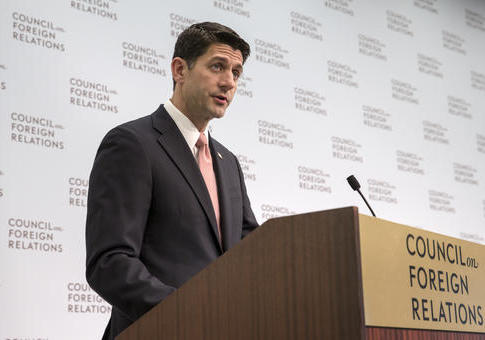Republican lawmakers led by House Speaker Paul Ryan (R., Wis.) unveiled a foreign policy agenda that makes the case for a more active America abroad and a strong NATO, running counter to some of the proposals of presumptive nominee Donald Trump.
Leading Republicans offered a strong rebuke of President Obama’s "lead from behind" foreign policy agenda in a 23-page policy document rolled out Thursday that argues for a strong NATO presence in Europe and underscores the importance of transatlantic alliances to defend freedom and advance American interests around the globe. The agenda calls for the reassertion of America’s presence internationally to ensure that "power vacuums" aren’t created and then filled by terrorists and other adversaries.
"In the past seven years, our friendships have frayed, our rivalries have intensified. It’s not too much to say that our enemies no longer fear us and too many of our allies no long trust us. And I think this is the direct result of the president’s foreign policy," Ryan said Thursday during the rollout event at the Council on Foreign Relations in Washington, D.C.
"All he did was create a void, or really, he created many voids around the world and now our enemies are stepping in to fill those voids. This is what happens when America does not lead."
The agenda was developed by the GOP’s Task Force on National Security, a group of committee chairs convened this year to develop proposals to influence the foreign policy of the next commander in chief, particularly if a Republican wins the White House.
The rollout comes as Trump receives scrutiny for his foreign policy positions. Trump has said that NATO is "obsolete," that he would not have intervened in the Syrian civil war, and that he would make other countries pay for defense aid. Critics have described Trump’s foreign policy as isolationist.
The agenda unveiled by Ryan, House Majority Leader Kevin McCarthy (R., Calif.), and others on Thursday makes the case for an America more engaged in the world’s challenges. It addresses a number of national security issues including terrorism, border security, and the need to strengthen the U.S. military, and particularly emphasizes the need for firm ties with America’s closest allies in Europe.
"U.S. forces should maintain a strong NATO presence in Europe, particularly by providing training and assistance to East European member states to strengthen the alliance’s deterrent on its frontier," the document states. "We must also press our allies to increase defense spending and military readiness, recognizing that NATO cannot be held together by a few main contributors and depended upon by a wider group of free-riders. States should meet their commitments so the alliance remains credible and effective. We also will seek to modernize NATO to ensure it keeps pace with the evolving threat landscape."
The agenda also underscores the need for organizations such as NATO to "be more actively brought into the fight" against terrorist groups such as ISIS in the Middle East.
Trump has criticized NATO on a number of occasions, accusing member countries of "not paying their fair share" during an April rally in Wisconsin.
"That means we are protecting them, giving them military protection and other things, and they’re ripping off the United States. And you know what we do? Nothing," Trump said then. "Either they have to pay up for past deficiencies or they have to get out."
"And if it breaks up NATO, it breaks up NATO," he added.
Trump has drawn criticism for complimenting Russian President Vladimir Putin, indicating that he would be open to talks with North Korean leader Kim Jong Un, and advocating for outlawed interrogation techniques such as waterboarding.
Republican Reps. Robert Goodlatte (Va.), Michael McCaul (Texas), Jeff Miller (Fla.), Ed Royce (Calif.), Mac Thornberry (Texas), and Devin Nunes (Calif.), all of whom are committee chairs, joined Ryan and McCarthy on Thursday.
The lawmakers sidestepped opportunities to criticize Trump’s foreign policy during discussion of their proposed agenda, emphasizing that the document can serve as a guide for the next administration to better enforce national security and advance American interests internationally.
"I can’t comment on his world view or anybody else’s," Thornberry said when asked by MSNBC reporter Andrea Mitchell, the moderator, about Trump’s suggestion that we leave alliances such as NATO. "What we lay out today talks about the importance of alliances. As frustrating as it can be to work with allies—and we encourage, for example, our European allies to do more, to contribute more to our joint defense efforts—but whether you’re talking about the Pacific, the Middle East, Africa, or Europe, alliances are essential. We’ve got to be a good ally."
"There are more questions than ever about how reliable we are as an ally," Thornberry continued.
McCaul took a harder line responding to Trump’s proposal to temporarily ban Muslims from entering the United States in an effort to stop Islamic extremists from entering the country.
"You can’t ban an entire race or a religion from coming into the country. What you need is a proper vetting system," McCaul said. "This is a document that we hope the nominee will read and take attention to. There are ways to properly vet and protect threats from coming into the United States without just a swath of a ban against any race or religion."
"I’ve always said that we have to be careful in our rhetoric because that can inflame the Muslim community and it can, in fact, help their recruiting efforts in some respects," McCaul later said.
Trump is expected to be officially named the GOP nominee for president at the party’s convention in Cleveland next month. However, the business mogul’s recent comments about a judge being biased because of his Mexican heritage have stirred speculation about efforts to deny Trump the nomination.
